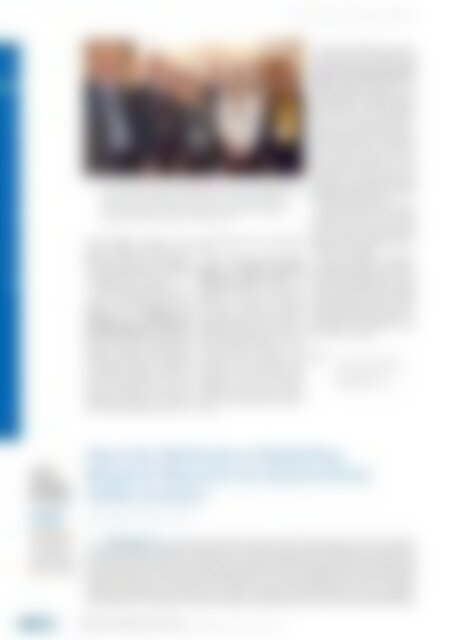You also want an ePaper? Increase the reach of your titles
YUMPU automatically turns print PDFs into web optimized ePapers that Google loves.
<strong>atw</strong> Vol. 63 (<strong>2018</strong>) | Issue 8/9 ı August/September<br />
464<br />
AMNT <strong>2018</strong> | YOUNG SCIENTISTS' WORKSHOP<br />
| | Award winners, sponsors and jury of the 49 th Annual Meeting on Nuclear Technology (AMNT <strong>2018</strong>)<br />
Young Scientists Workshop: (from left): Dr. Wolfgang Steinwarz, Prof. Dr. Marco K. Koch (Ruhr-Universität<br />
Bochum), Dr. Katharina Stummeyer (Gesellschaft für Anlagen- und Reaktorsicherheit gGmbH),<br />
Vera Koppers, Winner of the <strong>2018</strong> Young Scientists' Award, Dr. Jens Schröder (GNS Gesellschaft für<br />
Nuklear- Service mbH), Katharina Amend (2 nd ranked young scientist), Prof. Dr. Jörg Starflinger<br />
( Universität Stuttgart), María Freiría López 3 rd ranked young scientist.<br />
several different sections, each of<br />
them modelled separately with<br />
different correlations. A comparison<br />
with experimental data showed fairly<br />
reasonable results which are subject<br />
for improvement as a next step.<br />
Tobias Jankowski (Ruhr-Universität<br />
Bochum, mentoring: Prof. Koch) reported<br />
about Development and<br />
Validation of a Correlation for<br />
Droplet Re-Entrainment Estimation<br />
from Liquid Pools. The correlation is<br />
based on a dimensional analysis and<br />
therefore considers thermohydraulic<br />
boundary conditions by dimensionless<br />
quantities, which are quantified<br />
by empirical constants. These constants<br />
are obtained by four nearly<br />
steady test phases, taken from two<br />
experimental facilities of different<br />
scale. The correlation results are in a<br />
good agreement with experimental<br />
data.<br />
The presentation entitled Comparison<br />
of Different Wash-off<br />
Models for Fission Products on<br />
Containment Walls was given by<br />
Katharina Amend (Universität der<br />
Bundeswehr München, mentoring:<br />
Prof. Klein). A parameter variation<br />
was conducted with in the setting of a<br />
simplified geometry and with the<br />
geometry of the laboratory tests. One<br />
key influencing parameter for the<br />
resulting washed off mass is the<br />
percentage of area covered by water<br />
in each case, which differs with<br />
inclination and mass flow rate. First<br />
simulations with the laboratory<br />
geometry show satisfactory agreement,<br />
when compared to the experiments.<br />
Moritz Schenk (Karlsruhe Institute<br />
of Technology (KIT), mentoring: Prof.<br />
Cheng) gave a presentation about CFD<br />
Analysis of centrifugal Liquid Metal<br />
Pumps. Using the open-source software<br />
OpenFOAM the influence of the<br />
physical properties of liquid metals on<br />
the performance of a pump impeller<br />
and on the flow field is investigated.<br />
In general, the simulations show a<br />
relatively strong negative influence on<br />
head and efficiency for much higher<br />
viscosities and nearly no effect for<br />
lower viscosities compared to water.<br />
This qualitative behaviour is in good<br />
agreement with the literature. The<br />
optimization of the liquid metal pump<br />
is ongoing, focussing on the corrosion<br />
potential of the liquid metal.<br />
Summarizing, the scientific quality<br />
of papers presented by the young<br />
scientists in this year reached again<br />
a very high level. Therefore, all participants<br />
of the workshop should get<br />
honourable recognition.<br />
The jury awarded Vera Koppers<br />
(Gesellschaft für Anlagen- und Reaktorsicherheit<br />
(GRS) gGmbH) the 1 st price<br />
of the <strong>2018</strong> competition. Her compact<br />
as well as those of both the 2 nd ranked<br />
author, Katharina Amend (Universität<br />
der Bundeswehr München) and the 3 rd<br />
ranked author Maria Freiria (Universität<br />
Stuttgart) are published in this<br />
issue of <strong>atw</strong> – nucmag.<br />
Author<br />
Prof. Dr.-Ing. Jörg Starflinger<br />
Institute of Nuclear Technology<br />
and Energy Systems (IKE)<br />
Pfaffenwaldring 31<br />
70569 Stuttgart, Germany<br />
Young<br />
Scientists'<br />
Workshop<br />
WINNER<br />
Vera Koppers was<br />
awarded with the<br />
1 st price of the 49 th<br />
Annual Meeting on<br />
Nuclear Technology<br />
(AMNT <strong>2018</strong>) Young<br />
Scientists' Workshop.<br />
Heuristic Methods in Modelling<br />
Research Reactors for Deterministic<br />
Safety Analysis<br />
Vera Koppers and Marco K. Koch<br />
1 Introduction The national and international fundamental nuclear safety objective is to protect the public<br />
from ionising radiation [IAEA2016]. Although research reactors may have a smaller risk potential to the public than<br />
nuclear power plants, operators and researchers are at a higher risk [IAEA2016]. Deterministic safety analyses using<br />
thermal-hydraulic system codes are a prevalent and important instrument to evaluate the safety of nuclear power plants<br />
and research reactors. A wide range of safety analysis codes that are used for simulations of nuclear power plants are<br />
applicable to simulations of research reactors. The application range of the thermal-hydraulic system code ATHLET<br />
(Analysis of thermal-hydraulics of leaks and transients) – developed by GRS (Gesellschaft für Anlagen- und Reaktorsicherheit<br />
gGmbH) – was extended to simulated subcooled nucleate boiling processes at low pressure in 1994 [GRS2009].<br />
AMNT <strong>2018</strong> | Young Scientists' Workshop<br />
Heuristic Methods in Modelling Research Reactors for Deterministic Safety Analysis ı Vera Koppers and Marco K. Koch

















